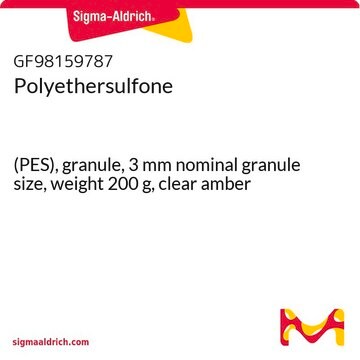おすすめの製品
詳細
degree of sulfonation: 60-90%
品質水準
形状
powder
分子量
20-80 kDa
色
white to beige
mp
>300 °C
官能基
sulfonic acid
ポリマー構造
shape: linear
InChI
1S/C12H8F2O8S3.C12H8F2O2S.C12H10O2.2Na/c13-9-3-1-7(5-11(9)24(17,18)19)23(15,16)8-2-4-10(14)12(6-8)25(20,21)22;13-9-1-5-11(6-2-9)17(15,16)12-7-3-10(14)4-8-12;13-11-5-1-9(2-6-11)10-3-7-12(14)8-4-10;;/h1-6H,(H,17,18,19)(H,20,21,22);1-8H;1-8,13-14H;;
InChI Key
MSKVMJLWNYCWLA-UHFFFAOYSA-N
詳細
Our polyaromatic sulfonic acid powder is a high-performance sulfonated aromatic polymer, featuring a degree of sulfonation of 70%. This proton conducting polymer is characterized by the presence of sulfonic acid groups attached to its aromatic backbone. The 70% degree of sulfonation imparts several unique properties to membranes made from it, including higher ionic conductivity and greater water uptake, without significantly compromising their mechanical properties such as breaking strength or tensile modulus. This balance of properties makes our polyaromatic sulfonic acid powder highly versatile and valuable in a wide range of applications that require both performance and durability.
アプリケーション
One of the primary applications of sulfonated aromatic polymers is in proton exchange membranes (PEMs), a critical component in fuel cells. Their high proton conductivity facilitates efficient transport of protons across the membrane, enabling the electrochemical reactions within the fuel cell to convert chemical energy into electrical energy. Beyond fuel cells, these polymers are utilized in redox flow batteries, contributing to the performance and longevity of these energy storage systems due to their chemical stability and proton conductivity.
Moreover, sulfonated aromatic polymers are employed in water treatment membranes for processes like reverse osmosis, nanofiltration, and ultrafiltration. Their chemical resistance allows them to withstand harsh environments while maintaining high water permeability, effectively separating and purifying water. These polymers are also explored for their potential in gas separation membranes, where they can selectively separate gases for various industrial processes. Continued research and development in this area promise further advancements and innovations in fuel cells, energy storage, water treatment, and gas separation.
Moreover, sulfonated aromatic polymers are employed in water treatment membranes for processes like reverse osmosis, nanofiltration, and ultrafiltration. Their chemical resistance allows them to withstand harsh environments while maintaining high water permeability, effectively separating and purifying water. These polymers are also explored for their potential in gas separation membranes, where they can selectively separate gases for various industrial processes. Continued research and development in this area promise further advancements and innovations in fuel cells, energy storage, water treatment, and gas separation.
関連製品
製品番号
詳細
価格
保管分類コード
11 - Combustible Solids
引火点(°F)
Not applicable
引火点(℃)
Not applicable
適用法令
試験研究用途を考慮した関連法令を主に挙げております。化学物質以外については、一部の情報のみ提供しています。 製品を安全かつ合法的に使用することは、使用者の義務です。最新情報により修正される場合があります。WEBの反映には時間を要することがあるため、適宜SDSをご参照ください。
Jan Code
939722-VAR:
939722-BULK:
939722-2G:
最新バージョンのいずれかを選択してください:
Amin Daryaei et al.
ACS applied materials & interfaces, 9(23), 20067-20075 (2017-05-23)
Two series of high molecular weight disulfonated poly(arylene ether sulfone) random copolymers were synthesized as proton exchange membranes for high-temperature water electrolyzers. These copolymers differ based on the position of the ether bonds on the aromatic rings. One series is
Jieun Choi et al.
Polymers, 13(11) (2021-06-03)
The purpose of this study was to investigate the effect of the aliphatic moiety in the sulfonated poly(arylene ether sulfone) (SPAES) backbone. A new monomer (4,4'-dihydroxy-1,6-diphenoxyhexane) was synthesized and polymerized with other monomers to obtain partially alkylated SPAESs. According to
ライフサイエンス、有機合成、材料科学、クロマトグラフィー、分析など、あらゆる分野の研究に経験のあるメンバーがおります。.
製品に関するお問い合わせはこちら(テクニカルサービス)









